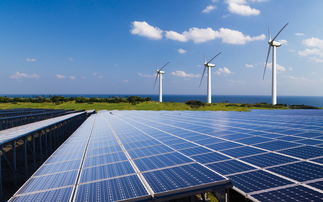Michael Gove's speech to the Oxford Farming Conference confirms he has sided with green campaigners in the debate on the future of agricultural subsidies, but can he now deliver on his bold vision?
Last autumn, I took a stroll with my Dad and my two year old son around the North Essex valley where I grew up. As we walked along one of the country lanes heading out of the village my son pointed at the vast rolling field that stretched for over a quarter of a mile across one side of the valley. "Look Daddy," he said, "a desert."
Out of the mouths of babes, hey. He was right, of course. The tilled field stretching to the horizon looked like nothing so much as a desert, a sense only amplified by the absence of birds in the sky and the grey monochrome of the soil.
In fairness, it is not always like this. For much of the year the field is filled with golden wheat or bright yellow rape, providing valuable produce in the heart of a region that is renowned for its good soils and high yields.
But it was also giant fields like this and the large scale farmers and landowners of East Anglia who Michael Gove must have been thinking of when he this morning declared that the Common Agricultural Policy (CAP) and its system of paying land owners based on the amount of land they own is "unjust, inefficient and drives perverse outcomes".
The CAP has long been a bete noire for environmentalists for good reasons. It is precisely as Gove describes. "It rewards farmers for sticking to methods of production that are resource-inefficient and also incentivises an approach to environmental stewardship which is all about mathematically precise field margins and not ecologically healthy landscapes."
Attempts to incentivise more environmentally friendly practices have foundered on the rocks of vested interests, poor policy design, and weak enforcement. As the EU's own auditors ruled late last year, the greening payments introduced in 2013 were "unlikely to enhance the CAP's environmental and climate performance significantly".
The biggest 'green lining' from a Brexit process that still contains enormous risks for many parts of the low carbon economy was always going to come from agricultural reforms, although you would have got long odds on Gove leading the green charge.
Today's speech further underscores Gove's high profile green conversion. It is both eloquent and sweeping in its reach, but it also contains policy specifics - most notably a proposal for a new system of sustainable food labelling and confirmation Gove's previous interest in some form of ecosystem services payment regime has been firmed up into a specific plan.
Details will still need to be ironed out, but Gove is explicit about which side of the debate he has come down - it's the side featuring Greenpeace, Friends of the Earth, and George Monbiot. Believe me, they are as surprised as anyone at this turn of events.
There are two hugely encouraging aspects of this plan for green businesses and campaigners.
Firstly, the pledge to start phasing in a shift from payment by land to payment by ecosystem services from the start of a five year transition period sends a powerful signal to farmers that more environmentally friendly practices will be rewarded in the near future.
As Gove revealed, payments that "give the most from the public purse to those who have the most private wealth" will be limited or capped, and a new approach that ensures "the principal public good we will invest in is environmental enhancement" will emerge.
Moreover, the promise to make such ecosystem service payments accessible to "almost any land owner or manager who wishes to enhance the natural environment" and the pledge to help farmers cope with transitional costs should unleash a new wave of improved environmental practices.
The potential here is enormous. In the space of a decade we could see practices embraced that enable re-wilding, improve flood protection, protect soils, reduce pesticide use, and enhance biodiversity, all while encouraging the investment in innovation that should ensure overall food production is not compromised. The very look and feel, not to mention the carbon footprint, of the UK could be transformed for the better. If Gove gets this right he will go down in history as the man who changed the very nature of the country.
Secondly, the underlying philosophy that shapes Gove's speech suggests that were such a subsidy regime to be introduced it could provide the basis for wave after wave of environmental improvement.
The introduction to the speech explored the immense pressures placed on global agriculture and land use by growing populations, changing diets, and interlocking environmental crises. It is worth quoting at length:
"The pressures placed on our global environment by this growth I've sketched out will be formidable - whether it's greenhouse gas emissions in our atmosphere contributing to global warming, desertification and soil erosion reducing the space for cultivation, deforestation leading to the disappearance of valuable carbon sinks and precious habitats, air pollution from traditional industry and intensive agriculture adding to health costs, waste poisoning our oceans or iconic landscapes under threat from the need for further development.
"Without action we face the progressive loss of the natural capital on which all growth - natural, human and economic - ultimately depends.
"So the imperative to husband, indeed wherever possible, enhance our natural capital - safeguarding our oceans, cleaning our rivers, keeping our soils fertile, protecting biodiversity - has to be at the heart of any plan for our country and our world.
"Because we cannot expect to live prosperous and civilised lives in the future unless we recognise that we have to care for that which gives us all life - our planet."
Gove has certainly come a long way from the neo-con, laissez faire lauding days of his previous life. Taken to its logical extreme his assessment suggests any new agricultural policy regime must provide a foundation for tackling these big existential challenges.
As the Committee on Climate Change made clear in a letter to Gove last year, efforts to cut emissions from agriculture have made precisely zero progress over the past six years and as a result farming's share of the UK's carbon footprint is increasing.
But a new system of payments for ecosystem services could provide the basis for long overdue action to tackle farming emissions. It is easy to see how payments for flood-preventing reforestation measures would not only curb emissions in themselves, they could also be accompanied by payments to incentivise livestock farming that reduces methane releases or technologies that turn waste into biogas. With Gove also expressing his concern about unsustainable diets, we could even see incentives used more broadly across the food chain to deliver a greener food mix.
Inevitably, there is a long way to go to deliver on this vision. As has been noted previously Gove is not always the most reliable witness, even to his own intentions. A reshuffle or political crisis could put the whole plan on hold. Moreover, much of what Gove wants to achieve is dependent to varying degrees on the nature of the final trade deal with the EU. European farmers will be keeping an eye out for anything that smacks of unfair subsidy and could scupper the whole vision by demanding that any trade deal locks the UK into aspects of the CAP. Any trade deal with the US or the latest surreal brain wave to sign the UK up to Pacific trade treaties could also swiftly undermine environmental gains from domestic subsidy reforms.
In addition, there are reasons why all previous attempts at meaningful CAP reform have faltered that cannot simply be laid at the door of Brussels' bureaucrats. The farming lobby is uniquely powerful and the grouse moor lobby is uniquely well connected. There will be a vociferous push back against Gove's green plan that will accuse him of everything from jeopardising the UK's food security and putting hill farmers out of business to joining the 'green blob' and betraying his Brexiter colleagues.
It is entirely possible that an ecosystem services plan that looks so good on paper is quickly and quietly watered down by intensive lobbying, weak enforcement, and a Brexit recession that delays the investment in innovation that must come alongside any reforms. Campaigners will need an eagle eye to ensure the promised payments really do incentivise meaningful changes and are not simply diverted to underpowered schemes that are gamed by the largest landowners with the savviest lawyers.
However, if we know one thing about Gove it is that he is not in politics to be popular and is firmly committed to drastic reform where he feels it is needed. As he told his audience today, "if we want to preserve that which we cherish - a thriving agriculture sector, a healthy rural economy, beautiful landscapes, rich habitats for wildlife, a just society and a fair economy - then we need to be able to shape change rather than seeking to resist it".
It is an open question as to whether Brexit was really required to drive more environmentally friendly farming practices, just as it is unclear if the benefits of quitting CAP outweigh the Brexit risks faced by other parts of the economy. But it is long past time we saw some green shoots in the desert that is agricultural policy. Here's hoping Gove can not only turn his latest 'green Brexit' plan into a reality, but also provide an agricultural subsidy regime template that the rest of the EU might one day follow.










